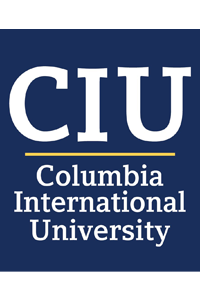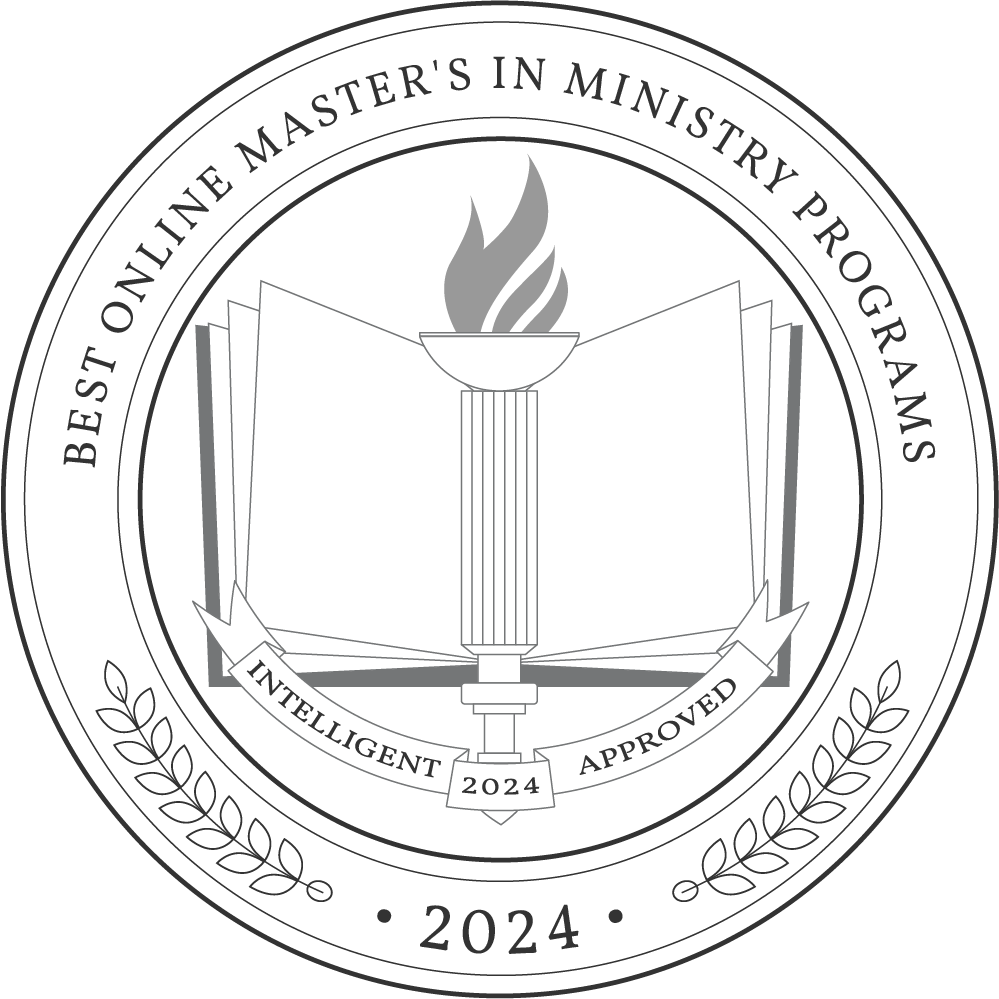A master’s in ministry degree prepares students for several different careers in the Christian ministry. These include work as church ministers, chaplains, ministry directors, college or university professors, counselors, youth pastors, missionaries, religious writers, and more.
According to the Bureau of Labor Statistics, the median annual pay for clergy is $58,920. The National Center for Education Statistics reports that the average tuition for a graduate degree is $12,596 at public universities and $28,017 at private universities.
Students who study full-time can typically complete an online master’s in ministry degree program in two years, but accelerated programs are also available and may be completed sooner.
How to Choose an Online Master’s in Ministry Program
Choose your area of study
This degree is typically offered as a Master of Arts (MA) or a Master of Divinity (MDiv). When choosing your area of study, you should already have an idea of what you’d like to do after graduation. Depending on whether you plan to become a church minister, chaplain, counselor, or something else, you’ll want to look for programs that allow you to customize your degree with courses and concentrations that will prepare you for your chosen career.
For example, some programs offer specializations in counseling, evangelism, family ministry, pastoral ministries, women’s leadership, or spiritual care. Also, universities often offer internships or field placements, where you can work with a senior pastor, worship leader, or nonprofit organization and gain experience in the overall functioning of a church or ministry.
Research schools and programs
You may want to attend a faith-based university, and the denomination might be important to you, so look for schools affiliated with your preferred church or denomination. Some universities are Christian but non-denominational. Others aren’t affiliated with any religion. If several universities meet your criteria, find out about the programs each offers. Take note of specific concentrations and internships related to your desired career. The following are some other factors you’ll want to consider:
- The university you choose should be officially accredited by agencies recognized by the U.S. Department of Education. This not only affects the quality of education, but it can also impact what financial aid you’re eligible for, employment opportunities, and what other postsecondary programs you can enroll in. For example, the DOE-recognized Association for Biblical Higher Education accredits programs specifically related to ministry and the Bible. If you’ve chosen a faith-based school, it should be recognized by its particular church or religious organization.
- Check to make sure the cost of the program is within the budget you’ve set. You may be able to eliminate some schools right away.
- The school’s location may be a factor to consider. Some programs offer a hybrid option that allows students to take some classes on campus. This is a good way to meet instructors and fellow students. Proximity to the university also lets students participate in clubs and organizations, mentorship programs, special events, or other on-campus activities.
To learn more about any schools that you’re interested in, you can visit the school’s website, contact an admissions counselor, follow the school on social media, or attend an in-person or virtual open house.
Prepare for tests and applications
Students generally don’t need to pass an entrance exam for this degree. There are likely GPA requirements, which students will confirm by submitting a copy of their undergraduate transcripts. You may also need to submit letters of recommendation and a personal statement.
Some universities have rolling admissions, while others have a specific application deadline. Start dates can also vary; at some schools, online and on-campus programs begin simultaneously. Others offer several start dates throughout the year.
Since the application process varies by school and program, you should always contact an admissions counselor to ensure you have the most accurate information regarding requirements and deadlines.
Select your program
When selecting a program, carefully weigh the features of each one. Decide on your priorities as well as where you’re willing to compromise and where you’re not. Make a list, in order of preference, of the schools that fit what you’re looking for. Submit applications for them all. You may be accepted to some programs but not others, so this will give you more options.
Before making your final decision, review your needs and goals again. Do you plan to attend school full-time or part-time? Are you only interested in 100% online programs, or are you fine with a hybrid program that has a few in-person requirements? Some programs offer asynchronous courses, which can be completed at your own pace, while others only offer synchronous courses, which involve remotely attending lectures and completing assignments at the same time as other students — which of these two online learning formats do you prefer? Your school should accommodate your scheduling needs and learning preferences.
Determine how you’ll pay for your degree
The university or other institutions may offer scholarships to the program. Also, check to see what financial aid is available via federal and state loans and grants. Be sure to complete the Free Application for Federal Student Aid (FAFSA). Some students take advantage of work-study programs offered through the university to help pay for their degrees. Beyond these possibilities, if your schedule allows, you can work part-time to help cover your costs. Those who already work in the field should see if their employer offers tuition assistance benefits as well.
Be sure to speak to financial aid counselors at the schools you’re interested in for the most accurate and specific information about program cost.
Best 42 Accredited Online Master’s in Ministry Programs
Institution Type
Status
- Intelligent Score
- Alphabetically By University Name
- Acceptance Rate
- Enrollment
- In-state Graduate Tuition
- Out-of-state Graduate Tuition
- In-state Undergraduate Tuition
- Out-of-state Undergraduate Tuition

Columbia International University
Intelligent Score: 99.15Undergraduate Tuition
In-state: $40,270
Out-of-state: $40,270
Graduate Tuition
In-state: $44,032
Out-of-state: $44,032
Test scores
SAT: 990-1160
ACT: 16-25
ESTIMATED COST PER CREDIT
$575
DELIVERY FORMAT
Online, On-Campus
ACCREDITATION
Southern Association of Colleges and Schools Commission on Colleges
REQUIRED CREDITS TO GRADUATE
42

Harding School of Theology
Intelligent Score: 99.01Undergraduate Tuition
In-state: $21,000
Out-of-state: $21,000
Graduate Tuition
In-state: $11,388
Out-of-state: $11,388
Test scores
SAT: 1060-1290
ACT: 21-29
ESTIMATED COST PER CREDIT
$720
DELIVERY FORMAT
Blended
ACCREDITATION
Higher Learning Commission
REQUIRED CREDITS TO GRADUATE
48

Mercer University
Intelligent Score: 97.33Undergraduate Tuition
In-state: $28,695
Out-of-state: $28,695
Graduate Tuition
In-state: $14,964
Out-of-state: $14,964
Test scores
SAT: 1180-1340
ACT: 25-31
ESTIMATED COST PER CREDIT
$990
DELIVERY FORMAT
Online
ACCREDITATION
Southern Association of Colleges and Schools Commission on Colleges
REQUIRED CREDITS TO GRADUATE
38

Northwest Nazarene University
Intelligent Score: 97.25Undergraduate Tuition
In-state: $32,130
Out-of-state: $32,130
Graduate Tuition
In-state: $10,836
Out-of-state: $10,836
Test scores
SAT: 980-1190
ACT: 19-25
ESTIMATED COST PER CREDIT
$550
DELIVERY FORMAT
Online
ACCREDITATION
Northwest Commission on Colleges and Universities
REQUIRED CREDITS TO GRADUATE
40

Multnomah University
Intelligent Score: 96.94Undergraduate Tuition
In-state: $27,370
Out-of-state: $27,370
Graduate Tuition
In-state: $13,920
Out-of-state: $13,920
Test scores
SAT: N/A
ACT: N/A
ESTIMATED COST PER CREDIT
$670
DELIVERY FORMAT
Online, On-Campus
ACCREDITATION
Northwest Commission on Colleges and Universities
REQUIRED CREDITS TO GRADUATE
48

Liberty University
Intelligent Score: 96.24Undergraduate Tuition
In-state: $14,791
Out-of-state: $14,791
Graduate Tuition
In-state: $7,935
Out-of-state: $7,935
Test scores
SAT: 1040-1250
ACT: 21-29
ESTIMATED COST PER CREDIT
$615
DELIVERY FORMAT
Online
ACCREDITATION
Association of Theological Schools
REQUIRED CREDITS TO GRADUATE
36

Southwestern Baptist Theological Seminary
Intelligent Score: 96.23Undergraduate Tuition
In-state: $23,910
Out-of-state: $23,910
Graduate Tuition
In-state: $20,640
Out-of-state: $20,640
Test scores
SAT: 1050-1260
ACT: 20-28
ESTIMATED COST PER CREDIT
$690
DELIVERY FORMAT
Online
ACCREDITATION
Southern Association of Colleges and Schools Commission on Colleges
REQUIRED CREDITS TO GRADUATE
25-26

Baptist Missionary Association Theological Seminary
Intelligent Score: 95.43Undergraduate Tuition
In-state: $20,350
Out-of-state: $20,350
Graduate Tuition
In-state: NA
Out-of-state: NA
Test scores
SAT: Not Required
ACT: Not Required
ESTIMATED COST PER CREDIT
$285
DELIVERY FORMAT
Online, On-Campus
ACCREDITATION
Southern Association of Colleges and Schools Commission on Colleges
REQUIRED CREDITS TO GRADUATE
60

Bethel University
Intelligent Score: 93.01Undergraduate Tuition
In-state: $38,870
Out-of-state: $38,870
Graduate Tuition
In-state: $11,700
Out-of-state: $11,700
Test scores
SAT: 1040-1338
ACT: 21-28
ESTIMATED COST PER CREDIT
$518
DELIVERY FORMAT
Online, On-Campus
ACCREDITATION
Higher Learning Commission
REQUIRED CREDITS TO GRADUATE
51

Covenant Theological Seminary
Intelligent Score: 92.99Undergraduate Tuition
In-state: NA
Out-of-state: NA
Graduate Tuition
In-state: $35,190
Out-of-state: $35,190
Test scores
SAT: 1260
ACT: 24 - 30
ESTIMATED COST PER CREDIT
$585
DELIVERY FORMAT
Online, On-Campus, Hybrid
ACCREDITATION
Association of Theological Schools
REQUIRED CREDITS TO GRADUATE
54

Clarks Summit University
Intelligent Score: 92.29Undergraduate Tuition
In-state: $26,082
Out-of-state: $26,082
Graduate Tuition
In-state: $8,280
Out-of-state: $8,280
Test scores
SAT: N/A
ACT: N/A
ESTIMATED COST PER CREDIT
$485
DELIVERY FORMAT
Online, On-Campus
ACCREDITATION
Middle State Commission on Higher Education
REQUIRED CREDITS TO GRADUATE
60

Southeastern Baptist Theological Seminary
Intelligent Score: 91.57Undergraduate Tuition
In-state: $20,751
Out-of-state: $20,751
Graduate Tuition
In-state: $25,228
Out-of-state: $25,228
Test scores
SAT: 980-1260
ACT: 19-23
ESTIMATED COST PER CREDIT
$609
DELIVERY FORMAT
Online, On-Campus
ACCREDITATION
Association of Theological Schools
REQUIRED CREDITS TO GRADUATE
49

Creighton University
Intelligent Score: 90.79Undergraduate Tuition
In-state: $41,176
Out-of-state: $41,176
Graduate Tuition
In-state: $16,686
Out-of-state: $16,686
Test scores
SAT: N/A
ACT: N/A
ESTIMATED COST PER CREDIT
$972
DELIVERY FORMAT
Online, On-Campus
ACCREDITATION
Higher Learning Commission
REQUIRED CREDITS TO GRADUATE
46

Moody Bible Institute
Intelligent Score: 90.64Undergraduate Tuition
In-state: $34,222
Out-of-state: $34,222
Graduate Tuition
In-state: $26,870
Out-of-state: $26,870
Test scores
SAT: 1020–1150
ACT: 17–23
ESTIMATED COST PER CREDIT
$495
DELIVERY FORMAT
Online, On-Campus
ACCREDITATION
Higher Learning Commission
REQUIRED CREDITS TO GRADUATE
36

Luther Rice College & Seminary
Intelligent Score: 89.69Undergraduate Tuition
In-state: $32,205
Out-of-state: $32,205
Graduate Tuition
In-state: $28,773
Out-of-state: $28,773
Test scores
SAT: Not Required
ACT: Not Required
ESTIMATED COST PER CREDIT
$332
DELIVERY FORMAT
Online
ACCREDITATION
Southern Association of Colleges and Schools Commission on Colleges
REQUIRED CREDITS TO GRADUATE
36

Hope International University
Intelligent Score: 88.76Undergraduate Tuition
In-state: $33,250
Out-of-state: $33,250
Graduate Tuition
In-state: $14,256
Out-of-state: $14,256
Test scores
SAT: 930-1100
ACT: 18-24
ESTIMATED COST PER CREDIT
$525
DELIVERY FORMAT
Online
ACCREDITATION
WASC Senior College and University Commission
REQUIRED CREDITS TO GRADUATE
36

Ohio Christian University
Intelligent Score: 88.09Undergraduate Tuition
In-state: $14,400
Out-of-state: $14,400
Graduate Tuition
In-state: $8,922
Out-of-state: $8,922
Test scores
SAT: N/A
ACT: N/A
ESTIMATED COST PER CREDIT
$1,020
DELIVERY FORMAT
Online, On-Campus
ACCREDITATION
Higher Learning Commission
REQUIRED CREDITS TO GRADUATE
36

Fresno Pacific University
Intelligent Score: 87.83Undergraduate Tuition
In-state: $32,954
Out-of-state: $32,954
Graduate Tuition
In-state: $14,940
Out-of-state: $14,940
Test scores
SAT: 930-1110
ACT: 16-22
ESTIMATED COST PER CREDIT
$495
DELIVERY FORMAT
Online, On-Campus
ACCREDITATION
Association of Theological Schools
REQUIRED CREDITS TO GRADUATE
54
How We Rank Schools
All of the schools featured in this guide have been approved by a DOE-recognized accrediting organization, such as the Association for Biblical Higher Education or the Association of Theological Schools.
These programs can be completed through online coursework. In instances where coursework is offered both online and on-campus, students may be able to take classes in-person or online, depending on their learning preferences and schedule.
Our team reviewed these programs based on their outcomes, reputation, flexibility, faculty, and price. Then, we calculated an Intelligent Score on a scale of 0 to 100 for each program. For a more extensive explanation, check out Our Ranking Methodology.
What Can You Expect from an Online Master’s in Ministry Program?
A master’s in ministry program combines theological and pastoral studies with counseling and administrative concepts. Christian theology and philosophy are included in the curriculum, but so are subjects such as mentoring, conflict resolution, team development, and pastoral caregiving skills.
The degree generally takes two years to complete, but there are many accelerated options for online students. Many programs can be completed entirely online, with no on-campus classes required.
When taking a degree program online, you’ll receive your course material via an online learning platform such as Canvas, Blackboard, or Moodle. Your account will give you access to the program syllabus, course material, assignments, and grades. This student portal also lets you communicate with other students and instructors using message boards and chat features. The learning format can be synchronous, asynchronous, or a combination of both.
Potential courses you’ll take in an online master’s in ministry degree program
- Biblical Interpretation. Students examine the various methods, principles, and approaches to interpreting the Bible. Both the Old and New Testaments are examined.
- History of Christian Thought. This course discusses the evolution of Christian philosophy and theology. Students gain a solid understanding of how these developed and changed over the centuries and became the Christianity we know today.
- Leadership in the Congregation. Ministers and pastors take on leadership roles in their churches, and this course prepares students for this weighty responsibility. They learn about leadership qualities — what they are, how to develop them, and how to implement them within Christian principles and church guidelines.
- Family Ministry. Ministers often take on the role of counselor, and this course teaches students effective methods for conflict resolution within families. Students will study how to combine modern techniques with church teachings to help married couples and children cope with today’s challenges.
What Can You Do With an Online Master’s in Ministry?
Career outlook
In addition to traditional pastoral roles, there are a variety of other career paths available to graduates with an online master’s in ministry. These roles may allow them to impact communities, provide spiritual guidance, and contribute to various aspects of religious and social life. Earning potential may vary based on factors such as location, experience, and specific responsibilities of the role. Here are some common career paths for individuals with advanced education in ministry:
- Social or community service manager — Oversee operations and secure funding for programs that support public well-being.
- Median annual salary: $77,030
- Projected employment growth (through 2032): 9%
- New job openings projected: 16,000 annually
- Social worker — Help individuals and families deal with problems in their everyday lives, such as health, behavioral, and financial issues.
- Median annual salary: $58,380
- Projected employment growth (through 2032): 7%
- New job openings projected: 63,800 annually
- Marriage or family therapist — Help clients work through issues in their family or relationship dynamics.
- Median annual salary: $58,510
- Projected employment growth (through 2032): 15%
- New job openings projected: 5,900 annually
Online Master’s in Ministry Frequently Asked Questions
How do I apply to an online master’s in ministry degree program?
These programs generally require a bachelor’s degree, but most universities don’t require that it be in theology or another religious studies field. While admission to campus-based classes may give preference to those who already have some experience working in a ministry position or related field, this isn’t as much of an issue for online applicants.
Most graduate programs require that applicants have a GPA of at least 3.0 out of 4.0. Transcripts should be provided. Those with a lower GPA may be admitted based on professional experience or strong personal references. It’s always a good idea to speak with an admissions counselor before applying.
How much does an online master’s in ministry degree cost?
The average cost of a master’s degree in ministry is between $10,000 and $23,000. There may be additional fees for books, software and other technology-related requirements, and various university services available to online students.
How long does it take to earn an online master’s in ministry degree?
Most students can complete an online master’s in ministry program in about two years. Many universities offer full- and part-time study options, which will affect how long it takes to earn the degree. A total of 30-39 credit hours is generally required, and this also has a bearing on the total time needed to complete the program.
Is an online master's in ministry worth it?
A master’s in ministry program provides individuals with a deepened understanding of theology, pastoral care, and leadership, preparing them for diverse roles within religious organizations. Graduates gain the expertise to address complex spiritual and social issues, making meaningful contributions to their communities.
One of the key benefits of earning an online master’s in ministry is flexibility. Online programs allow individuals to access course materials, lectures, and assignments from anywhere with an internet connection. This flexibility is particularly advantageous for those juggling ministry responsibilities, community service, or family commitments.
